Understanding THCa Flower vs Delta 9 THC
The cannabis industry has seen a surge in interest and innovation, leading to a deeper understanding of its various compounds. Among these, THCa and Delta 9 THC stand out due to their unique properties and effects. This article explores the differences between THCa flower vs Delta 9 THC, providing insights into their uses, benefits, and potential impacts.
What is THCa?
THCa, or tetrahydrocannabinolic acid, is a non-psychoactive cannabinoid found in raw and live cannabis plants. Unlike its more famous counterpart, Delta 9 THC, THCa does not produce a high when consumed in its natural state. This compound is the precursor to THC and converts into Delta 9 THC through a process called decarboxylation, which occurs when cannabis is heated.
Benefits of THCa
Research into THCa is still in its early stages, but preliminary studies suggest several potential benefits:
- Anti-inflammatory properties: THCa may help reduce inflammation, making it a potential option for those with conditions like arthritis.
- Neuroprotective effects: Some studies indicate that THCa might protect brain cells, which could be beneficial for neurodegenerative diseases.
- Anti-emetic properties: THCa has shown promise in reducing nausea and vomiting, particularly in chemotherapy patients.
Understanding Delta 9 THC
Delta 9 THC is the most well-known cannabinoid, primarily responsible for the psychoactive effects associated with cannabis. It binds to cannabinoid receptors in the brain, leading to the characteristic high. Delta 9 THC is often used recreationally, but it also has several medicinal applications.
Benefits of Delta 9 THC
Delta 9 THC offers a range of therapeutic benefits, including:
- Pain relief: It is widely used for its analgesic properties, helping to alleviate chronic pain.
- Appetite stimulation: Known for inducing hunger, Delta 9 THC can be beneficial for individuals with appetite loss due to medical treatments.
- Sleep aid: It may help improve sleep quality for those suffering from insomnia or other sleep disorders.
Comparing THCa Flower and Delta 9 THC
While both THCa and Delta 9 THC originate from the cannabis plant, their effects and applications differ significantly. Understanding these differences can help consumers make informed choices based on their needs and preferences.
Psychoactive Effects
One of the most significant differences between THCa and Delta 9 THC is their psychoactive properties. THCa is non-psychoactive, meaning it does not produce a high. This makes it appealing for those seeking the therapeutic benefits of cannabis without the mind-altering effects. In contrast, Delta 9 THC is psychoactive and is often sought after for its euphoric effects.
Consumption Methods
THCa is typically consumed in its raw form, often through juicing or as a dietary supplement. It can also be found in tinctures and capsules. Delta 9 THC, on the other hand, is commonly consumed through smoking, vaping, or edibles, where the decarboxylation process has already occurred.
Legal Status
The legal status of THCa and Delta 9 THC varies by region. In many places, THCa is legal due to its non-psychoactive nature. Delta 9 THC, however, is subject to stricter regulations and is often only legal in areas where recreational or medical cannabis use is permitted.
Case Studies and Research
Several studies have explored the potential benefits of THCa and Delta 9 THC. For instance, a study published in the Journal of Neuroimmune Pharmacology highlighted THCa’s potential in reducing inflammation and neurodegeneration. Another study in the European Journal of Pharmacology demonstrated Delta 9 THC’s effectiveness in pain management.
These studies underscore the therapeutic potential of both compounds, though more research is needed to fully understand their effects and applications.
Consumer Considerations
When choosing between THCa flower and Delta 9 THC, consumers should consider their desired effects and legal constraints. Those seeking non-psychoactive benefits may prefer THCa, while individuals looking for recreational use or specific medical applications might opt for Delta 9 THC.
It’s also important to consult with healthcare professionals, especially for those using cannabis for medical purposes, to ensure safe and effective use.
Conclusion
THCa and Delta 9 THC offer distinct benefits and applications, catering to different consumer needs. THCa provides therapeutic effects without the high, making it suitable for those seeking non-psychoactive options. Delta 9 THC, with its psychoactive properties, is popular for both recreational and medicinal use. Understanding these differences can help consumers make informed decisions and maximize the benefits of cannabis.

